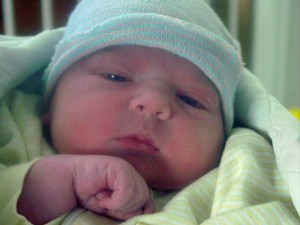Has it been four years? I was featured in a Natural Childbirth Article!
Happy 4th Birthday Connor Hawk Johnston!
 Four years ago, I was featured in a Natural Childbirth Article in Pearland, Texas. This day is what inspired me to become a labor doula!
Four years ago, I was featured in a Natural Childbirth Article in Pearland, Texas. This day is what inspired me to become a labor doula!
Baby on board
By Mary Openshaw
The Facts
Published February 21, 2007
These days, when a woman is having a baby, she’s got more options than just which hospital to go to. Choices range from whether to have the baby at home, with or without traditional pain-killers, to penciling it in on the calendar and going for an elective C-section.
Here’s a little information about some of the options out there.
Natural childbirth
“Natural” childbirth, where the mother receives no general pain-killers, still has plenty of adherents. At Rite of Passage Women’s Health and Birth Center in Pearland, owner Bernadette Olivier, a Certified Nurse Midwife, focuses first on natural remedies and techniques to bring mothers through their deliveries. Epidurals aren’t offered, and localized anesthetic is used in cases where a mother needs stitches after the birth.
“Your body builds up its own endorphins to get you through labor,” Olivier said.
She added women who opt for natural childbirth recover more quickly.
“Most of my moms are able to leave the birthing center within four to six hours,” she said.
 On Friday, Lisa Johnston of Katy was at the birth center, in labor with her third child, a son to be named Hawk. This was her first experience with natural childbirth. She’s had bad experiences with epidurals. When her daughter was born seven years ago, the epidural fell out and had to be put back in. Two years ago when she had her son, it took the anesthesiologist 20 sticks and 45 minutes to get the epidural in place.
On Friday, Lisa Johnston of Katy was at the birth center, in labor with her third child, a son to be named Hawk. This was her first experience with natural childbirth. She’s had bad experiences with epidurals. When her daughter was born seven years ago, the epidural fell out and had to be put back in. Two years ago when she had her son, it took the anesthesiologist 20 sticks and 45 minutes to get the epidural in place.
“After I had my son, I always said if I had another baby I wanted it to be natural,” she said. “To me, it’s about knowing what my body can do, and about educating my family, and my daughter, who thinks babies come out of your knees.”
Midwifery
The word “midwife” literally means “with woman.” A midwife offers prenatal — as well as post-partum care, aids a mother in delivering her child and offers other women’s health services. Midwives typically help women have natural childbirths.
“Midwifery is a matter of listening to your body,” Olivier explained. “Your body knows how to birth a baby.”
 Midwives work in a variety of settings. Some work in birth centers, or attend patients who want to have home births. Others, like Clute resident Jane Freking, work in hospitals.
Midwives work in a variety of settings. Some work in birth centers, or attend patients who want to have home births. Others, like Clute resident Jane Freking, work in hospitals.
“When you have a physician at a hospital, your doctor comes in when the baby’s ready to be born,” said Freking, a certified nurse midwife who works with East Houston Midwives, a group that provides midwifery for patients at East Houston Regional Medical Center.
“(Midwives) spend more time with the mother while she’s in labor and do a lot more patient education and teaching,” she said. “We focus on the whole person, not just the pregnancy. It’s the mother and the baby and the family as a whole unit.”
Midwives will not induce labor, and might not take patients with high-risk pregnancies. Olivier said she refers women expecting twins, those who have had previous cesarean sections, those with uncontrolled diabetes or chronic high blood pressure, to an obstetrician.
Freking said when she has a high-risk patient, she works with a doctor. “The person would stay in my care, but with input from doctor,” she said. “There are factors that can interfere with a natural pregnancy, and that’s when you need input from a physician. Most nurse midwives have a collaborative relationship with a physician.”
Check with your insurance provider to make sure they cover midwife care.
“A lot of them will only reimburse if you use a certified nurse midwife,” Olivier said. “Insurance providers are coming around, as they see that birthing centers, with their shorter recovery time, are a savings for them.”
When choosing a midwife, ask for a her credentials, and about her experience. Freking and Olivier each have a master’s degree in nursing. Olivier has 15 years’ experience as a registered nurse and Freking has 17.
Texas recognizes two types of midwives. One is the Certified Nurse Midwife, which would be a Registered Nurse who’s completed a graduate level midwifery program certification from the American College of Nurse Midwives. Certified Nurse Midwives are licensed through the state’s Board of Nurse Examiners.
 The other type are Licensed Midwives. These are not registered nurses, but they have hands-on training and are certified by the North American Registry of Midwives. They are licensed through Texas’ Department of State Health Services.
The other type are Licensed Midwives. These are not registered nurses, but they have hands-on training and are certified by the North American Registry of Midwives. They are licensed through Texas’ Department of State Health Services.
What many women like about midwifery is that they are in charge of their labor and delivery.
“At the hospital, you’re not in control of anything,” said Johnston, awaiting the birth of her son at Rite of Passage. “They tell you when you’re having a contraction, they tell you when to push, they tell you when you can hold your baby. Delivering here is much more personable.”
Also, families are more involved in the birth when midwives are used.
“If she wanted to, my 7-year-old could catch the baby,” Johnston said.
Water birth
In a water birth, mothers deliver their babies in a Jacuzzi-like pool where the water is heated to roughly body temperature.
“The body just floats and relaxes, and the ladies can enjoy the warmth,” Olivier said. She added that water births can decrease labor time by as much as half an hour to two hours.
According to information from Rite of Passage, water birth has a lot of benefits for both mother and baby. Among them is the fact that water birth seems to result in lower adrenaline levels in the mother, which means she makes more of the hormone that helps contractions be more efficient. Giving birth in the water also results in a small decrease in the mother’s blood pressure.
The baby also benefits from being born in the water.
“Water birth is less traumatic for the baby. It’s less shocking,” Olivier said. “It’s a better way of transitioning into the world.”
It’s safe, too.
“People wonder if the baby could drown during a water birth, but the babies aren’t taking a breath yet,” Olivier explained. “It’s the change in air pressure (from the womb to the open air) that causes their lungs to expand and causes them to take a breath. They won’t try to breath until they’re out of the water.”
Elective cesareans
At the other end of the spectrum from natural childbirth is CDMR, short for Cesarean Delivery on Maternal Request, meaning women choosing to have a C-section when it isn’t medically necessary.
“There is a trend out there for C-section on demand,” Freking said.
Women choose CDMR for a variety of reasons including concerns about pain and trauma of vaginal birth, ability to schedule and plan around the delivery, and avoiding complications of vaginal delivery due to weakened pelvic muscles.
More insurance providers are covering elective cesareans, but having one may not be a good idea. In March 2006, a scientific review on elective C-sections sponsored by the National Institutes of Health found that women should avoid having an elective cesarean birth if they plan to have other children later on, according to an article posted at www.medicinenet.com. The article says cesarean sections raise the risk of complications with the placenta in later pregnancies.
Doula What?
Some women choose to hire a doula, a female companion who provides physical and emotional support to a woman in labor.
• The word comes from ancient Greek, and basically means “servant-woman.” Historically, it referred to the most important female servant in the household, who most likely helped the lady of the house during labor and delivery.
• A modern doula’s services could include massage and other natural pain relief practices during labor; help with the preparation of a birth plan; positioning suggestions during labor and birth, and more.
• For information about certified doulas, including how to locate one in your area, visit Doulas of North America online at www.dona.org.
(Article originally posted here is longer available.)
Mary Openshaw is a features writer for The Facts. Contact her at (979) 237-0155.
